Key takeaways:
- Political participation extends beyond voting to include ongoing engagement and discussions, emphasizing the importance of being informed and active in community matters.
- Political media platforms play a critical role in shaping public opinion, enabling grassroots movements, and fostering inclusive political discourse.
- Different types of political media, such as social media, news websites, and podcasts, each serve unique functions in informing and engaging citizens.
- Strategies for effective political engagement include leveraging local events, participating in digital campaigns, and educating oneself and others about the political process.
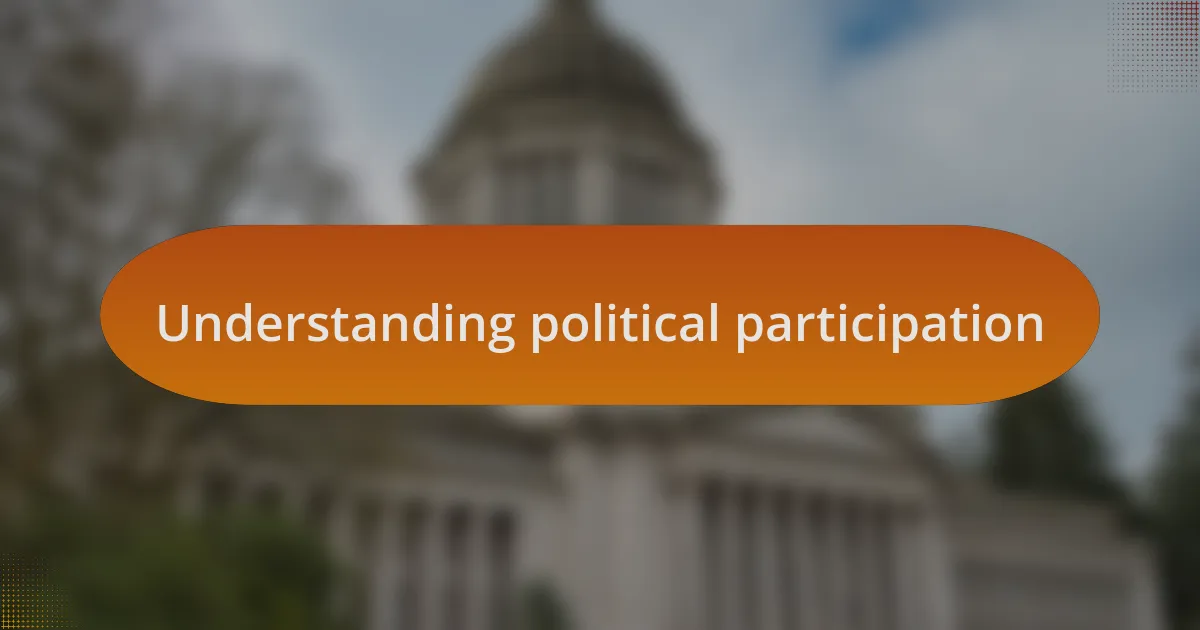
Understanding political participation
Political participation encompasses various forms of engagement, from voting to activism. I remember my first time voting; it felt empowering to have a say in shaping my community. But, beyond just casting a ballot, how often do we consider the influence of our voices in discussions and movements?
When I think about political participation, I realize that it’s not just about what we do during elections. It’s about being informed and involved in ongoing conversations that affect our lives. Have you ever felt that urge to speak out on an issue you care about? I have, and it transformed my understanding of what it means to be an active participant in democracy.
Moreover, political participation can take on many forms, including discussions on social media or attending town hall meetings. I once attended a local council meeting simply out of curiosity, and it opened my eyes to the complexities of decision-making in my town. It made me wonder: what if more people took the time to participate in such discussions? The collective impact of engaged citizens can truly shape the direction of policies and community initiatives.

Importance of political media platforms
When we think about the role of political media platforms, it’s clear they serve as crucial channels for disseminating information. I recall scrolling through news feeds during election season, feeling bombarded yet informed about candidates’ positions and debates. Isn’t it fascinating how a tweet or a shared article can ignite conversations and push people to engage more deeply with issues?
These platforms also act as a sounding board for public opinion, highlighting diverse perspectives that might otherwise go unheard. I remember encountering a passionate blog post that shifted my understanding of a local issue. It was a reminder that everyone has a voice worth listening to, and platforms that amplify those voices are essential for fostering an inclusive political discourse.
Furthermore, political media platforms empower grassroots movements, enabling ordinary citizens to mobilize and advocate for change. I once watched a small community rally grow into a nationwide movement after gaining traction online. Isn’t that the power of modern communication? The ability to unite people around a common cause shows just how vital these platforms are in shaping our political landscape.
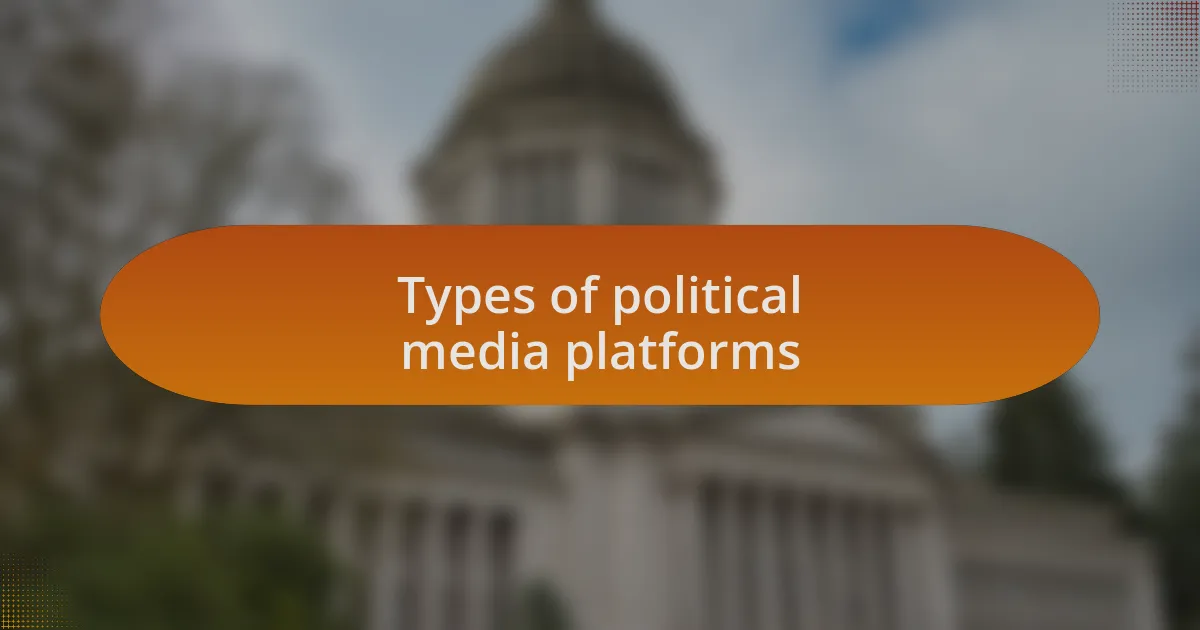
Types of political media platforms
There are several types of political media platforms that have emerged, each serving unique roles in the political landscape. Social media platforms like Twitter and Facebook connect users instantly, allowing real-time sharing of thoughts, news, and opinions. I still remember the excitement I felt after sharing a video clip of a political debate on Twitter, only to find a vibrant discussion unfold in the comments. It really brought home the idea that a single post can spark engagement from people across the globe.
News websites and online publications serve as another critical type of platform, providing in-depth analysis and commentary. These platforms often balance facts with personal insights, which can help readers form opinions based on various viewpoints. A few years back, while reading an article on a significant policy change, I appreciated the way the author painted a vivid picture of its potential impact on everyday citizens. This kind of perspective is essential; it’s what turns abstract policies into relatable narratives that engage people on a personal level.
Podcasts represent a more innovative approach to discussing political issues, often featuring interviews and conversations that make complex topics accessible. I find listening to political podcasts during my commute not only informs me but also engages my mind, prompting deeper reflection on the issues being discussed. Have you ever had a moment of clarity from a podcast episode that reshaped your understanding of a political matter? For me, it’s those rich discussions that make me feel more connected to the political process and the people who are part of it.
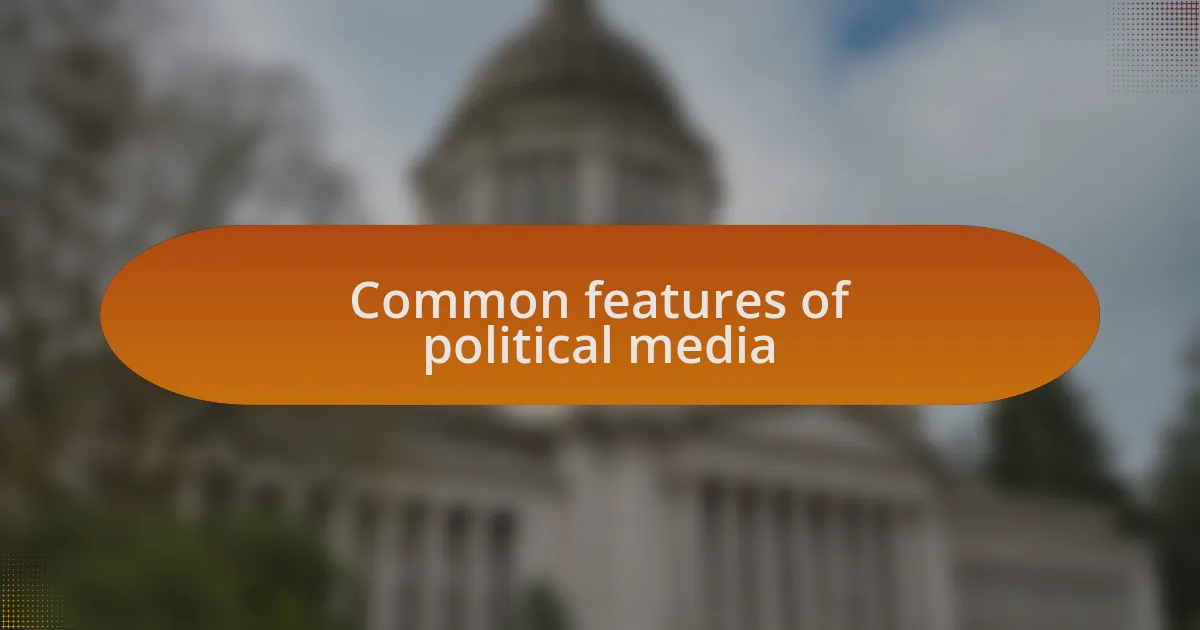
Common features of political media
Political media share some common features that distinguish them from other types of media. One prominent characteristic is their ability to facilitate dialogue and engagement among diverse audiences. I recall once participating in a packed online forum discussion about an election, where differing opinions sparked passionate exchanges. This interaction highlighted how political media serve not just to inform but also to connect people through shared interests and differing perspectives.
Another essential feature is the emphasis on timeliness. Political events unfold rapidly, and I often find myself scrolling through newsfeeds, eager to catch up on the latest developments. It’s intriguing how certain news platforms prioritize breaking news updates, turning them into crucial resources for those wanting to stay informed. Can you remember a time when a breaking news alert changed your understanding of a political situation? For me, those moments often lead to urgent conversations with friends and family about the implications of what I just learned.
Lastly, the incorporation of various formats—such as videos, articles, and infographics—helps make complex political information more digestible. I appreciate how a well-designed infographic can distill intricate policy information into engaging visuals. Have you ever stumbled upon a chart that made you rethink an issue entirely? These elements enrich my comprehension and help me engage with difficult subjects in meaningful ways.
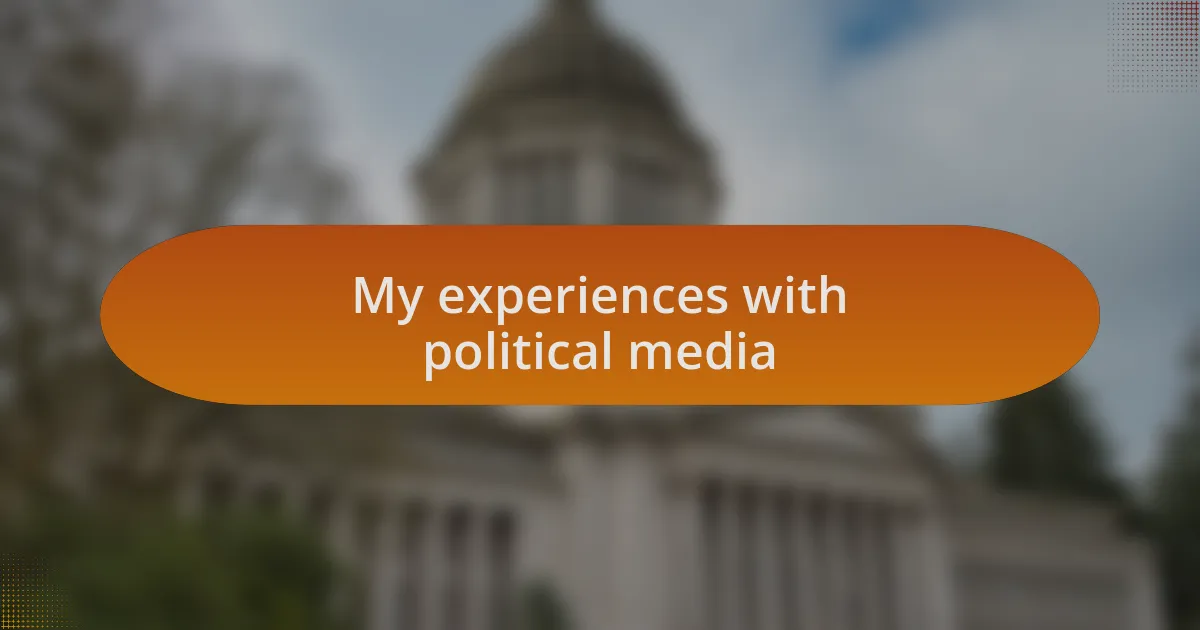
My experiences with political media
Engaging with political media has been a transformative experience for me. I vividly remember a night during a major election when I discovered a live stream featuring debates between candidates. The energy in the comments section was infectious, with people from various backgrounds sharing their thoughts in real time. It made me realize that political media can ignite a sense of community and urgency, as if we were all in the same room, passionately vying for our preferred vision of the future.
Social media plays a significant role in how I consume political content. I often find myself in lively discussions on platforms like Twitter, where a single tweet can set off a chain reaction of opinions and debates. I recall an instance where a trending hashtag sparked debates that not only opened my eyes to different viewpoints but also compelled me to reevaluate my own beliefs. Isn’t it fascinating how a brief interaction can prompt deep self-reflection?
I also find that podcasts have reshaped my understanding of political issues. One particular episode on civic engagement struck a chord with me; the host shared personal stories of individuals who transformed their communities through grassroots movements. Listening to those stories inspired me to explore ways I could contribute locally. Have you ever been moved to action by something you heard? For me, that realization connected the dots between media consumption and real-world impact, making the role of political media not just informative but genuinely motivational.
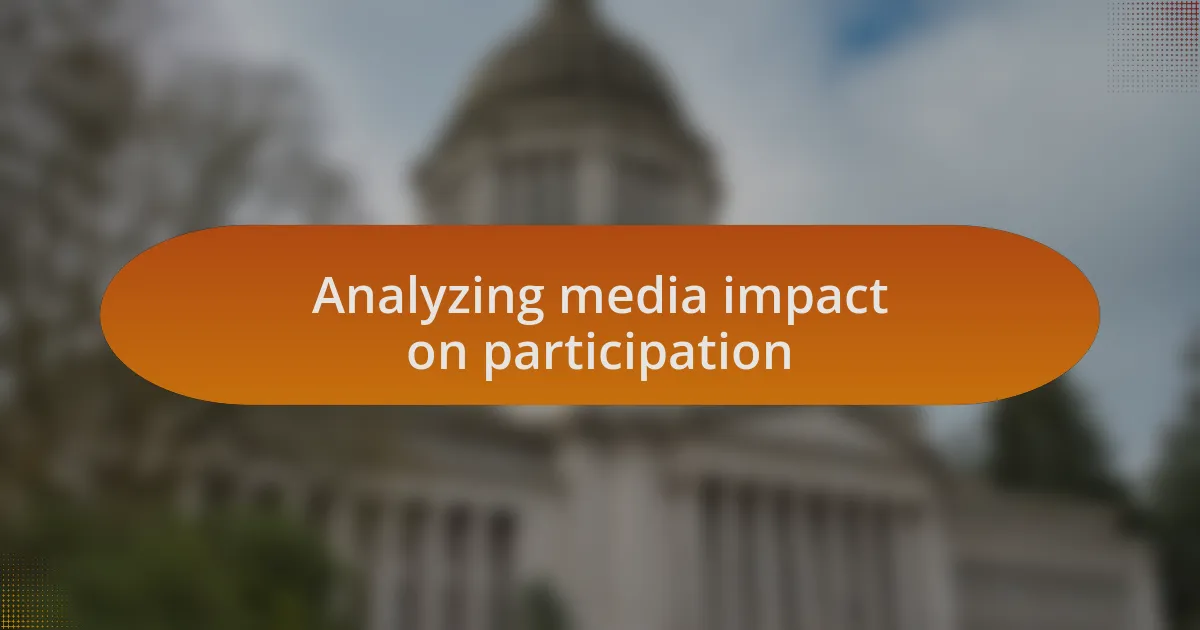
Analyzing media impact on participation
One of the most striking observations I’ve made about media’s influence on political participation is the way it amplifies voices that often go unheard. I remember watching a documentary focusing on grassroots movements, highlighting individuals who used social media platforms to organize protests. Seeing their stories unfold made me reflect on how media can empower ordinary citizens to engage with political processes, transforming them from passive observers into active participants. Can you imagine the potential when someone’s tweet inspires a rally?
Moreover, I’ve noticed that news coverage can frame issues in ways that directly impact how I engage with them. For instance, when a major news network spotlighted environmental policies, I found myself motivated to join local initiatives aimed at sustainability. It struck me how the media acts as a filter, shaping my perceptions and prompting me to act in ways I hadn’t considered before. How often do we stop to think about the narratives we’re consuming?
Social media, for all its challenges, has a unique capacity to foster connection and dialogue. I recall a time when I participated in a Facebook group dedicated to discussing immigration reform, where members shared personal experiences and expert viewpoints. This exchange not only broadened my understanding but also sparked a personal commitment to advocate for policy changes. In this era of instant information, is it possible that our engagement with these platforms can lead to a more informed and participatory society?
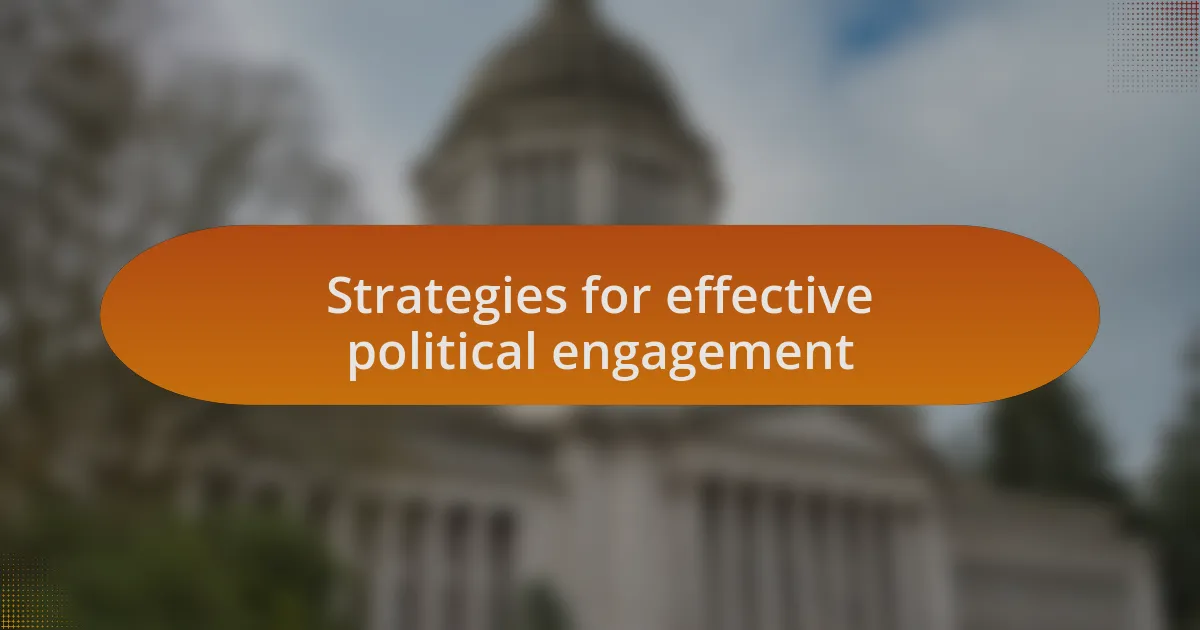
Strategies for effective political engagement
One effective strategy for political engagement is leveraging local community events to spark discussions. I remember attending a town hall meeting, where I met individuals from diverse backgrounds who brought unique perspectives. The energy in that room was palpable, and it made me realize how important it is to create spaces for dialogue, no matter how small. Have you ever felt a sense of belonging when sharing your views with others face-to-face?
Digital campaigns can also serve as a powerful tool for expanding engagement. I’ve found that participating in online petitions or virtual town halls allows me to connect with people advocating for causes I care about. In fact, that’s how I first learned about a local candidate running for office who focused on education reform. It’s fascinating how a simple click can mobilize support and influence decision-makers; isn’t it incredible to think of the collective power behind those small actions?
Another strategy is to educate oneself and others about the political process. I often share articles and resources with friends, hoping to spark their interest in topics I feel passionate about. I recall discussing the importance of voting rights and how informed citizens can drive meaningful change in their communities. In your experience, how does knowledge impact your willingness to engage politically? Sharing insights not only empowers us but fosters a community of engaged citizens ready to make a difference.